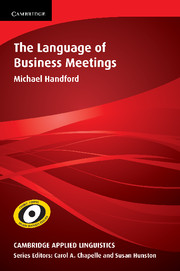Book contents
- Frontmatter
- Contents
- Series editors' preface
- Acknowledgements
- Transcription conventions
- 1 CANBEC: Corpus and context
- 2 Background: Theory and methodology
- 3 The business-meeting genre: Stages and practices
- 4 Significant meeting words: Keywords and concordances
- 5 Discourse marking and interaction: Clusters and practices
- 6 Interpersonal language
- 7 Interpersonal creativity: Problem, issue, if, and metaphors and idioms
- 8 Turn-taking: Power and constraint
- 9 Teaching and learning implications
- Appendix
- Index
5 - Discourse marking and interaction: Clusters and practices
Published online by Cambridge University Press: 05 April 2013
- Frontmatter
- Contents
- Series editors' preface
- Acknowledgements
- Transcription conventions
- 1 CANBEC: Corpus and context
- 2 Background: Theory and methodology
- 3 The business-meeting genre: Stages and practices
- 4 Significant meeting words: Keywords and concordances
- 5 Discourse marking and interaction: Clusters and practices
- 6 Interpersonal language
- 7 Interpersonal creativity: Problem, issue, if, and metaphors and idioms
- 8 Turn-taking: Power and constraint
- 9 Teaching and learning implications
- Appendix
- Index
Summary
Readers of business literature, such as magazines, textbooks and vocabulary books, might assume that business people regularly use such words as profit, merger and shareholder when doing business. This chapter will show that in reality, single words like profit are less frequent than one may think; instead, much business language, like everyday naturally occurring speech (O'Keeffe et al., 2007), is made up of clusters – that is, groups of two or more words that regularly reoccur (for instance, at the end of the day). The prevalence of such items provides further evidence for Sinclair's ‘idiom principle’ (1991), which argues that a considerable amount of language is made up of collocations, including fixed and semi-fixed phrases (discussed in Chapter 4 of this volume). These clusters, it is argued here, fulfil specialized discursive roles, and are repeated in various meetings involving different employees, companies, industries and nationalities.
Nelson's (2000) distinction between the language people use when doing business and the language people use when talking about business helps to explain this issue. When people talk about business, then it seems reasonable to expect them to use words like profit and shareholder. An interview in a magazine or a lecture on an MBA programme would be two such genres where speakers talk about business. In a meeting – and this goes for meetings involving colleagues within the same company as well as external meetings – the speakers are doing, as opposed to analysing, business.
Information
- Type
- Chapter
- Information
- The Language of Business Meetings , pp. 118 - 149Publisher: Cambridge University PressPrint publication year: 2010
